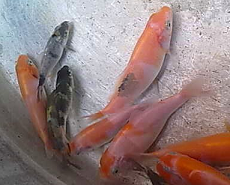 Koi are usually sexually mature by the time they reach about 2 - 3 years of age. But however, for the best results, hobbyists have always preferred 4 years and above mature fish for breeding purposes as young fry produced from here are better off compared to those coming from younger parents. The best koi that should be selected for your breeding program should be at least 17” in length with good body mass (looks chubby) which means that those are healthy breed to collect the fry. Avoid using Koi fish that are stunted or some of which are genetically small because all your effort will go to waste especially with the time spent and it’s really frustrating to end up with low quality batch of fry with poor colors.
Koi are usually sexually mature by the time they reach about 2 - 3 years of age. But however, for the best results, hobbyists have always preferred 4 years and above mature fish for breeding purposes as young fry produced from here are better off compared to those coming from younger parents. The best koi that should be selected for your breeding program should be at least 17” in length with good body mass (looks chubby) which means that those are healthy breed to collect the fry. Avoid using Koi fish that are stunted or some of which are genetically small because all your effort will go to waste especially with the time spent and it’s really frustrating to end up with low quality batch of fry with poor colors.Baby koi coming from healthy well-fed parents usually have higher survival rate. Apart from that, their size is also normally much bigger as the eggs from where they hatch from is larger and contains more yolk sac for them to consume during their early stage of development. And because of this factor, they will grow much faster since they have good start and early advantage. In view of this, it is imperative that one should make an effort to try to breed koi which are selected only from the best lot which are the healthiest and most mature fish.
The best time trying to breed your pet koi should be during the start of spring when temperature starts to go up again after long period of hibernation. Koi fish are usually rather weak and fragile during the first week but with constant supply of extra supplement coupled with good nutrition, you will find that they will start to put on weight again. As the water turns warm, this will induce your fish to spawn and provided you have male and female fish, they will start to produce eggs.
The breeding pond specially made for your koi should be as large as possible which measures at least 1000 gallons and above. Needless to say that the system must be equipped with reliable filtration system coupled with aeration unit (if you can afford one) and on top of that the pond should also be filled with dense vegetation to provide cover for the fry when they hatch. Once you observe that they the eggs are being released immediately remove the parents and quickly shut off the filtration system to prevent fry from being sucked in. Eggs will take about 1- 2 days before they hatch. If you can see two dark spots appearing on the eggs, this means that you have a successful spawn. (Related: Koi pond design considerations)
When your breeding pond is ready, it is time to select the right koi for your program. Female and Male koi can be rather difficult to tell apart because sometimes they don’t show the expected physical appearance. Males usually develop something what you call “tubercles” that look like small tiny white pimples that pop up from their gill area and pectoral fins (if you are not sure where the gill is, check out fish anatomy). Females filled with eggs also look bulging over at the ventral area and you will notice the appearance if you observe carefully and examine more closely from the top. One note of precaution however is that you should get yourself prepared and try to lower the water level during the spawning process because heavy chasing can sometimes cause the females to jump out of the pond. I have one of mine that died because I actually outnumbered the males to females (which are accidental of course due to wrong judgment made during the selection process)
Young koi fry after they hatched from their eggs rely heavily on their attached yolk sac for survival. During the first 2 – 3 days, they will hardly move and even if they do it will be some jerky short trip from one location to another. Most of the time they will just cling to the pond surface and during this period, they will continue to consume the yolk sac. Once it reached the fifth day, it is time to begin your feeding regime. Make sure that you have supply of brine shrimps enough and ready to feed the lot. Another alternative which you can use to provide constant supply of cheap aquarium foods is by using microworms which is also equally nutritional.








